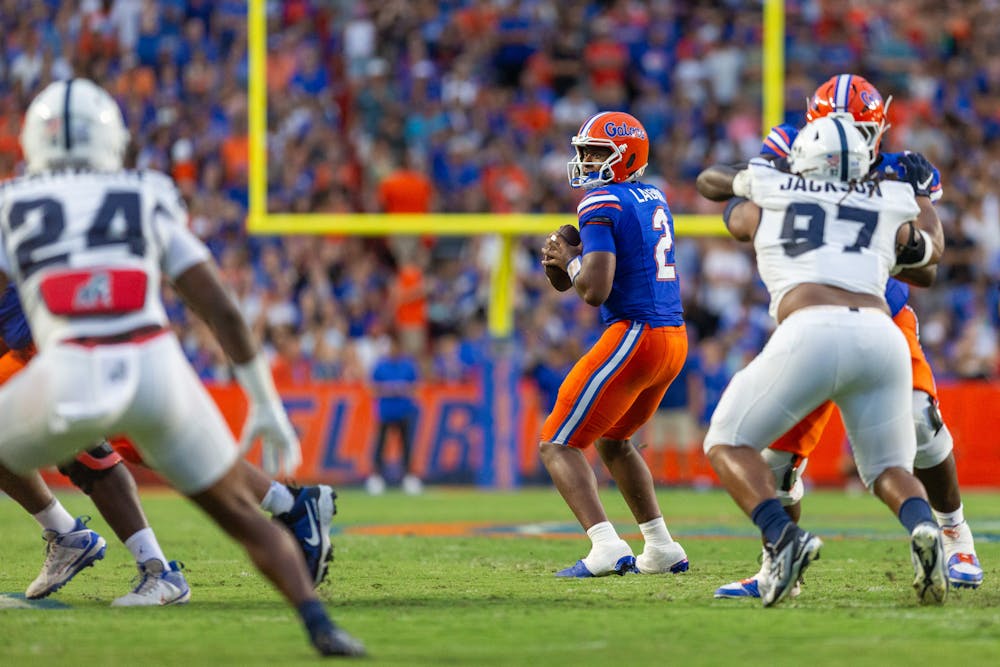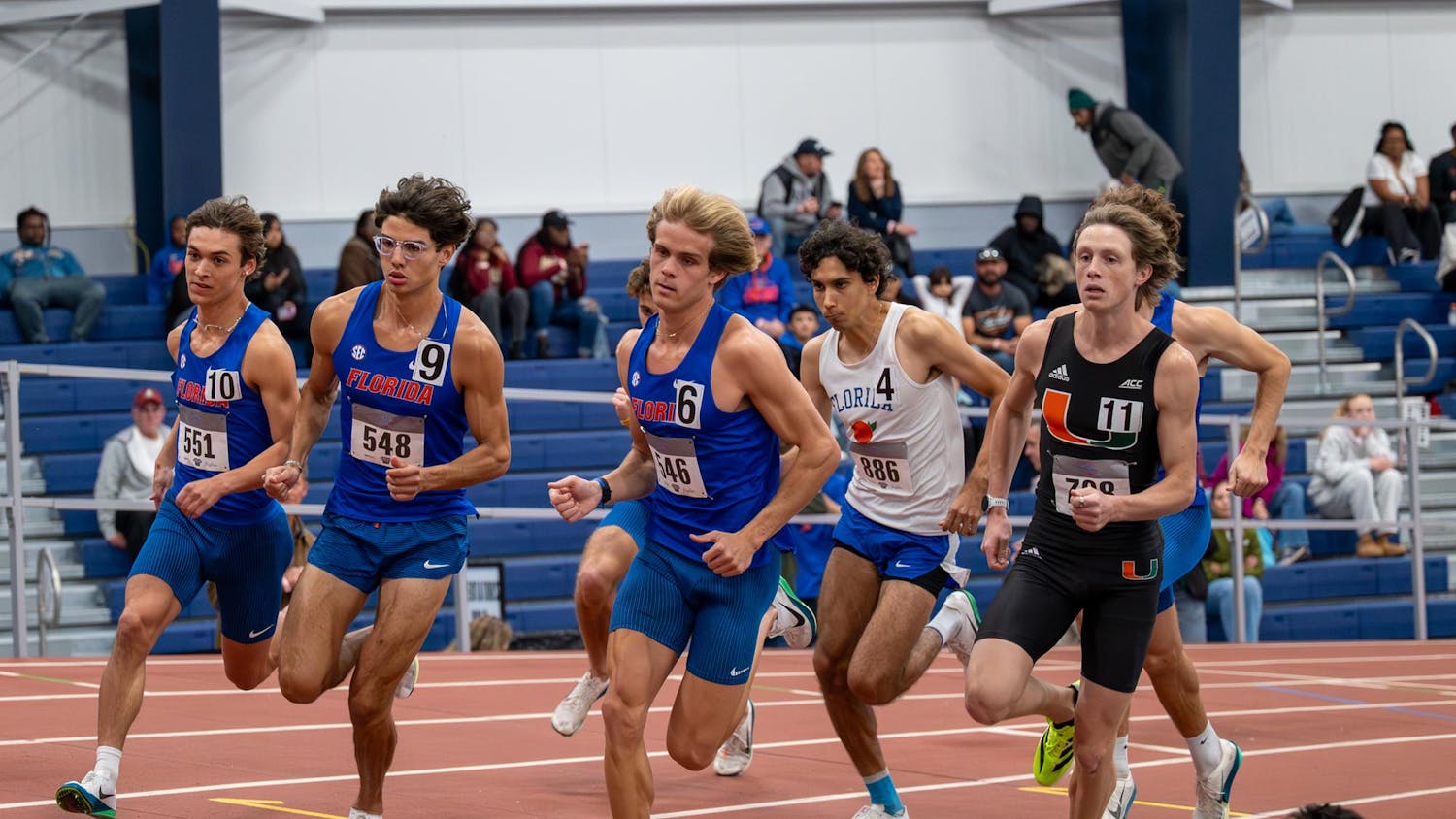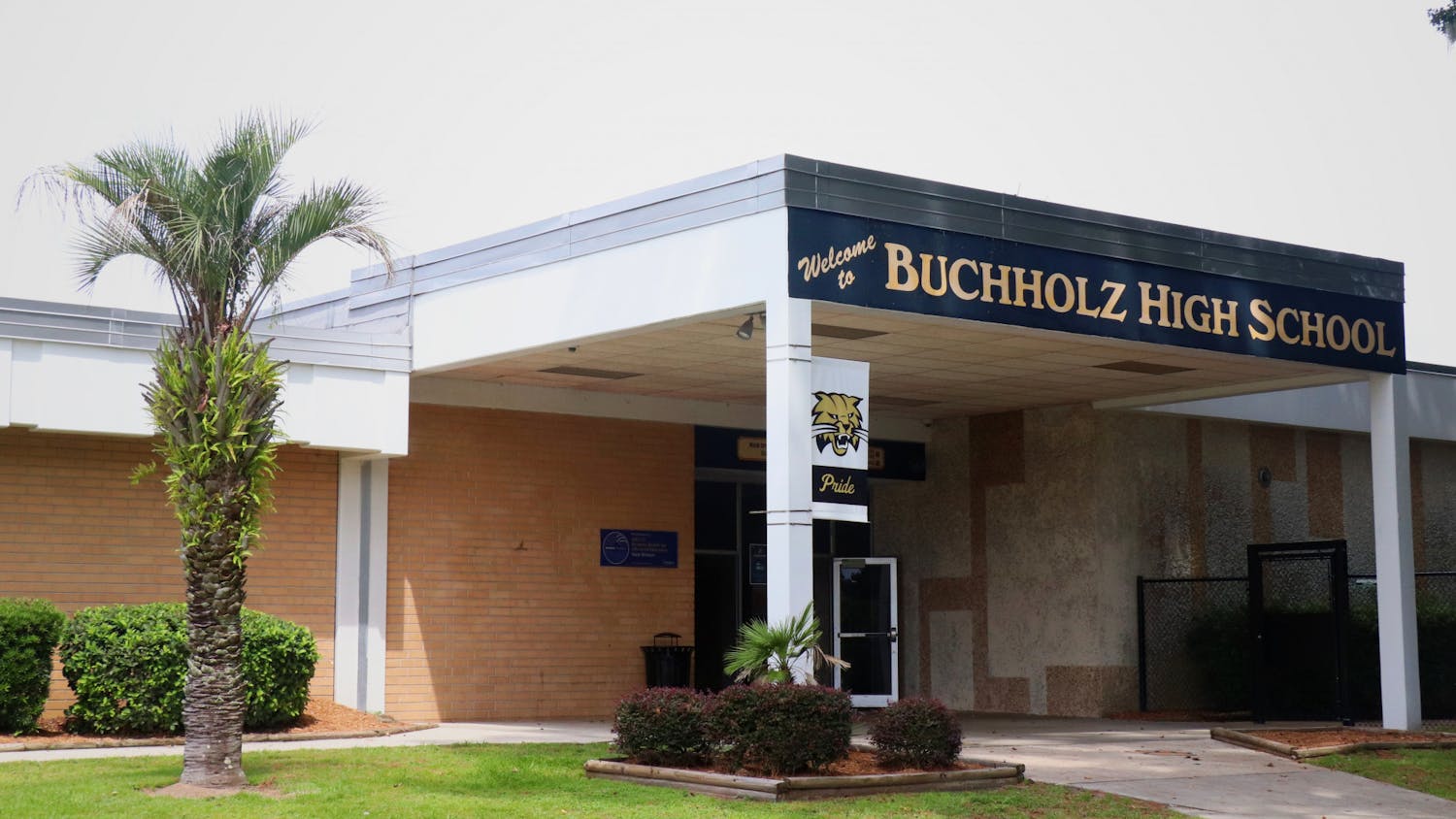By the end of the first quarter, 71-year-old Betty Knight was drenched in sweat, eating ice chips and keeping a cool rag on her head like a parched desert wanderer, savoring the last drops of an oasis.
She flew all the way from Gainesville, Texas, to watch the Aggies play the Gators and support the team she’s been a fan of for 51 years. The heat was something she said she didn’t expect, though.
“Texas heat is different,” Knight said. “It feels like it’s in the hundreds to me.”
Outside the Swamp, it was only 86 degrees.
Across the stadium, heat injuries happen to fans at every home game. According to UPD, at the University of Miami game on Aug. 31 well over a hundred people suffered a heat-related injury.
The crowds, excitement and Gainesville sun lend themselves to the blanket of heat that grips the stadium and supposedly gives UF an advantage against ill-conditioned teams.
Justin Faroni, a former UF criminology student who now serves at the UF Police Department, is one of many officers responding to these events at every home game. During the Miami Game, Faroni had eight to 10 people suffer heat related injuries in his section alone.
“One of the biggest challenges is just bridging that gap from somebody being in the first row to getting them somewhere where someone can get them help,” he said.
According to the American Red Cross, victims of heat-related injuries have difficulty walking or even standing, so the trek up the stadium steps to get them into the shade can be challenging.
“You kind of have to do your own type of triage,” said Faroni.
Once up the steps, Faroni would hand off the heat casualty to one of many first responders on deck for these emergencies. Alachua County Fire Rescue, Gainesville Fire Rescue and the Gator Emergency Medical Response Unit work the games to handle injuries.
Rescue crews also rely on the support of stadium staff to assist them in caring for victims of heat injuries.
Five minutes into the Aggies game, concession stand volunteer Abbie Rich, a cheerleader at Buchholz High School, was giving ice cubes to the Swamp’s first victim of the heat.
Rich said the woman was carried from the stands by two police officers, unable to stand, drenched in sweat, panting and red. Quickly, the officers sat her down and started giving her care. They poured water and rubbed ice on her arms, permitting her only small sips of water. Within minutes, Alachua County Fire Rescue arrived on scene, carrying her away in their modified golf cart.
“We see four to five incidents like this every game,” Rich said.
Among heat related injuries, there are two main categories: heat exhaustion and heat stroke. Heat exhaustion is the most common suffered at games.
Symptoms include heavy sweating, weakness or tiredness, clammy skin, fast or weak pulse, muscle cramps, nausea and fainting, according to the Mayo Clinic. Generally, someone who suffers from heat exhaustion will recover quickly after medical attention, though symptoms can last up to 48 hours.
The treatment mostly consists of getting out of the sun and using rapid body cooling techniques, like pouring water or rubbing ice on the skin. It’s important to avoid drinking too much water, as that can lower the salt content of the blood to a dangerous level. The Centers for Disease Control and Prevention recommends drinking one cup, or eight ounces, of water every 15 to 20 minutes.
If treatment is not forthcoming, or if symptoms go unnoticed, heat exhaustion can lead to the rarer, more deadly heat stroke.
Dr. Ivan Da Silva, an associate professor in UF’s neurology department, also works in the Shands Hospital neurocritical care unit and cares for the rare patients whose injuries require intense treatment.
“If you develop heat stroke, which is a multi-organ dysfunction situation with extreme heat, you can start developing brain cell death,” he said.
These kinds of injuries are rare, but can be extremely serious. According to Da Silva, between 5% and 10% of heatstroke victims will develop long-term neurological injuries affecting cognition, memory, coordination and balance. Some can develop serious immediate effects like seizures or comas.
A number of conditions can make someone more susceptible to heat stroke. Heart disease, dehydration, drunkenness, antidepressants and anxiety medications can heighten the chances. In general, if you are elderly or a child, you are also more vulnerable.
Additionally, rising global temperatures will only make heat-related injuries more common and severe as extreme heat days become more common. They already have. According to the CDC, heat related deaths more than doubled from 1999 to 2023.
Da Silva said those numbers may be underreported.
“Someone will die practicing sports, or at the stadium — let's say they had a heart attack or a seizure,” he said. “It’s very rare that people will put on their death certificate that heat was the main culprit.”
Da Silva said there are things students and fans can do to lessen their risk of heat-related injuries.
Wearing appropriate clothes to the stadium is one — avoid dark colors or long sleeves. If it’s a hot day, avoid alcohol and sugary drinks, which can dehydrate you and increase the heat production in your body.
Take full advantage of the hydration stations provided by stadium staff, areas spread out where anyone can drink free cold water. If you’re feeling too hot, go inside, bask in the fans, watch a play or two on the TVs. Use sunscreen, eat a light meal and watch out for your friends.
Contact Nathan Thomas at nathan.thomas@ufl.edu. You can also reach him at 786-423-0705.






